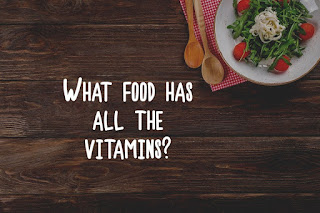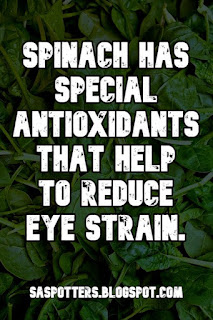 |
| 4 Foods that have all the vitamins |
Before we look at the foods that contain all of the vitamins that you need, let's look at what those vitamins are.
What are the vitamins that your body needs?
- Vitamin A
- Vitamin B (B 1 (Thiamine), B 2 (Riboflavin), B 3 (Niacin), B 5 (Pantothenic Acid), B 6 (Pyridoxine), B 7 (Biotin), B 9 (Folate) and B 12 (Cobalamin))
- Vitamin C
- Vitamin D
- Vitamin E
- Vitamin K
What foods have all the vitamins?
- Raw spinach
- Salmon
- Blueberries
- Eggs
1. Raw spinach
Raw spinach is higher in some vitamins that are sensitive to heat than cooked spinach. Water soluble vitamins may also be lost through water drainage.
Spinach has an enormous amount of health benefits. It contains antioxidants that clean out your cells and support eye health. The fiber in spinach feeds good gut bacteria.
Vitamins in spinach
According to
Nutrition Data, 100 grams (or 3.5 Ounces) of raw spinach has:
- 9376 International Units (or 188% of your daily requirement) of Vitamin A
- 0.1 Milligrams (or 5% of your daily requirement) of Thiamine (Vitamin B 1)
- 0.2 Milligrams (or 11% of your daily requirement) of Riboflavin (Vitamin B 2)
- 0.7 Milligrams (or 4% of your daily requirement) of Niacin (Vitamin B 3)
- 0.1 Milligrams (or 1% of your daily requirement) of Pantothenic Acid (Vitamin B 5)
- 0.2 Milligrams (or 10% of your daily requirement of Pyridoxine (Vitamin B 6)
- 194 Micro-grams (or 49% of your daily requirement) of Folate (Vitamin B 9)
- 28.1 Milligrams (or 47% of your daily requirement) of Vitamin C
- 2 Milligrams (or 10% of your daily requirement) of Vitamin E
- 483 Micro grams (or 604% of your daily requirement) of Vitamin K
- 18 Milligrams of Choline
- 550 Milligrams of Betaine
 |
| Spinach is good for your eyes. |
2. Salmon
Salmon is high in protein which is crucial to keep all your body tissues strong - not just your muscles. It also contains Omega 3 fatty acids, which support brain, heart and cardiovascular health.
Vitamins in salmon
100 Grams (or 3.5 ounces) of salmon have the following vitamins:
- 50 International Units (or 1% of your daily requirement) of Vitamin A
- 0.3 Milligrams (or 23% of your daily requirement) of Thiamine (Vitamin B 1)
- 0.1 Milligrams (or 8% of your daily requirement) of Riboflavin (Vitamin B 2)
- 8 Milligrams (or 40% of your daily requirement) of Niacin (Vitamin B 3)
- 1.5 Milligrams (or 15% of your daily requirement) of Pantothenic Acid (Vitamin B 5)
- 0.6 Milligrams (or 32% of your daily requirement) of Pyridoxine (Vitamin B 6)
- 34 Micro grams (or 8% of your daily requirement) of Folate (Vitamin B 9)
- 2.8 Micro grams (or 47% of your daily requirement) of Cobalamin (Vitamin B 12)
- 3.7 Milligrams (or 6% of your daily requirement) of Vitamin C
 |
| Salmon is healthy. |
3. Blueberries
Blueberries are also packed full of important vitamins. They make a tasty treat that gives you good nutrients instead of the unhealthy stuff that is found in sweets or other processed treats.
Vitamins in blueberries
- 54 International Units (or 1% of your daily requirement) of Vitamin A
- 2% of your daily requirement of Thiamine (Vitamin B 1)
- 2% of your daily requirement of Riboflavin (Vitamin B 2)
- 0.4 Milligrams (or 2% of your daily requirement) of Niacin (Vitamin B 3)
- 0.1 Milligrams (or 1% of your daily requirement) of Pantothenic acid (Vitamin B 5)
- 0.1 Milligrams (or 3% of your daily requirement) of Pyridoxine (Vitamin B 6)
- 6 Micro grams (or 1% of your daily requirement) of Folate (Vitamin B 9)
- 9.7 Milligrams (or 16% of your daily requirement) of Vitamin C
- 0.6 Milligrams (or 3% of your daily requirement) of Vitamin E
- 19.3 Micro grams (or 24% of your daily requirement) of Vitamin K
- 6 Milligrams of Choline
- 0.2 Milligrams of Betaine
 |
| Choose healthy. |
4. Eggs
Vitamins in eggs
- 1183 International Units (or 24% of your daily requirement) of Vitamin A
- 0.2 Milligrams (or 11% of your daily requirement) of Thiamine (Vitamin B 1)
- 1.2 Milligrams (or 68% of your daily requirement) of Riboflavin (Vitamin B 2)
- 0.2 Milligrams (or 1% of your daily requirement) of Niacin (Vitamin B 3)
- 3.5 Milligrams (or 35% of your daily requirement) of Pantothenic Acid (Vitamin B 5)
- 0.3 Milligrams (or 17% of your daily requirement) of Pyridoxine (Vitamin B 6)
- 114 Micro grams (or 29% of your daily requirement) of Folate (Vitamin B 9)
- 3.1 Micro grams (or 52% of your daily requirement) of Cobalamin (Vitamin B 12)
- 85.1 International Units (or 21% of your daily requirement) of Vitamin D
- 2.4 Milligrams (or 12% of your daily requirement) of Vitamin E
- 0.7 Micro grams (or 1% of your daily requirement) of Vitamin K
- 610 Milligrams of Choline
- 1.5 Milligrams of Betaine
 |
| Eggs are awesome. |
How to get all of the vitamins that you need every day
As you can see, some of these super foods contain a lot of certain vitamins, while they contain less of other vitamins. In order to make sure that you get all of the vitamins that you need every day, make sure that you eat a healthy variety of these foods.
Don't only eat one of these foods per day. Have at least three of them regularly and mix it up with things like
lemon juice,
green tea,
black pepper and
ginger.
 |
| Two is better than one! |
This salad is a fantastic option for combining super foods together into one easy and delicious meal. It contains chicken, avocado, spinach, lettuce, lemon juice, vinegar and black pepper. You can easily substitute the chicken for salmon and you can add eggs for even more vitamins. Stay Strong!







No comments:
Post a Comment